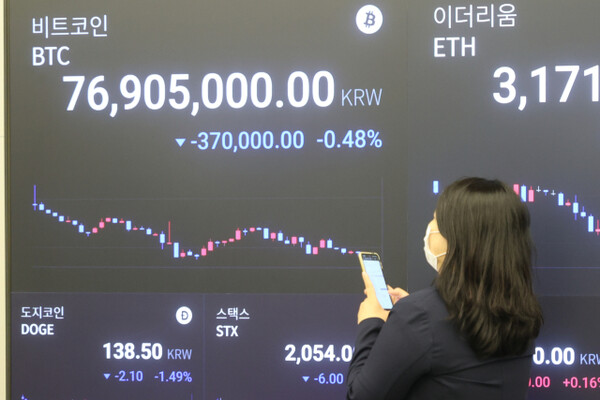
This year, the investment destinations that have provided investors with substantial profits are Bitcoin and gold. On the other hand, domestic stocks have performed poorly, recording ‘minus’ results.
According to Daishin Securities on the 19th, when comparing the returns of investment tools from January 1st of this year to the 11th of this month, Bitcoin (based on dollar) ranked at the top with an excellent performance of 30%. According to CoinDesk, a virtual asset specialized media outlet, the price of Bitcoin during this period rose 30.46% from $44,184.37 (about 58.88 million won) to $57,643.25 (about 76.8 million won).
During the same period, the domestic gold wholesale price based on the Korea Exchange rose from 367,000 won per 1 don (3.75 g) to 463,000 won, recording a 26.16% increase. This is because the expectation of a real interest rate decline due to the US Federal Reserve’s (Fed) base rate cut pushed up the gold price. This means that the possibility of a weaker dollar due to the base rate cut was perceived as a positive factor for the gold price. It is analyzed that the gold purchase movement by major central banks due to geopolitical instability occurring around the world also drove up the price increase.
As domestic investors' interest in overseas stocks increases, the SPDR S&P 500 ETF, which tracks the U.S. Standard & Poor's (S&P) 500 index, also recorded a high return of 17.30%. On the other hand, the return of the representative ETF linked to the KOSPI 200 index, 'KODEX 200', showed a contrasting return of -7.54%. The average return of domestic stock funds that use an active management strategy with a stock inclusion ratio of 70-100% also showed a low level of -3.32%.
During the same period, KOSPI fell 5.34%, the lowest among the major indices of G20 countries except for Russia (-15%), Mexico (-10.79%), and China (-7.14%). This is a poor result compared to the United States (S&P 500, 16.44%), India (12.80%), Japan (6.44%), and the EU (5.35%).
Bond investment has shown steady returns. According to the bond index (Hanshinpyeong), the bond yield this year was 4.81%. The won-dollar exchange rate rose 4.26% and the won-yen exchange rate rose 3.09%, respectively, due to exchange rate fluctuations. Deposits were 2.7%.
Real estate also performed poorly with negative returns. According to the national housing transaction price index released by the Korea Real Estate Board, the national comprehensive housing transaction price index this year fell 0.15 percentage points (P) from 96.04 to 95.90. Compared to other investment vehicles such as Bitcoin and gold, the returns on real estate are minimal.
Daishin Securities analyzed that investors were able to record high returns this year as they paid attention to alternative assets such as Bitcoin and gold. In contrast, domestic stocks and real estate did not perform as well as expected.
According to Seungbin Cho, team leader at Daishin Securities’ asset allocation team, “As the possibility of an economic downturn emerged in early August, the domestic stock market, which is relatively sensitive to the global economy, was negatively affected,” and “The adjustment by Nvidia, which emerged along with concerns about the profitability of artificial intelligence (AI), led to a decline in stock prices in the domestic semiconductor industry.”
He continued, “Concerns about an economic downturn are somewhat excessive, and the semiconductor industry is in a state of improvement,” and “As export growth is also good, concerns about an economic downturn will ease in the fourth quarter, allowing the domestic stock market to rebound flexibly.”






